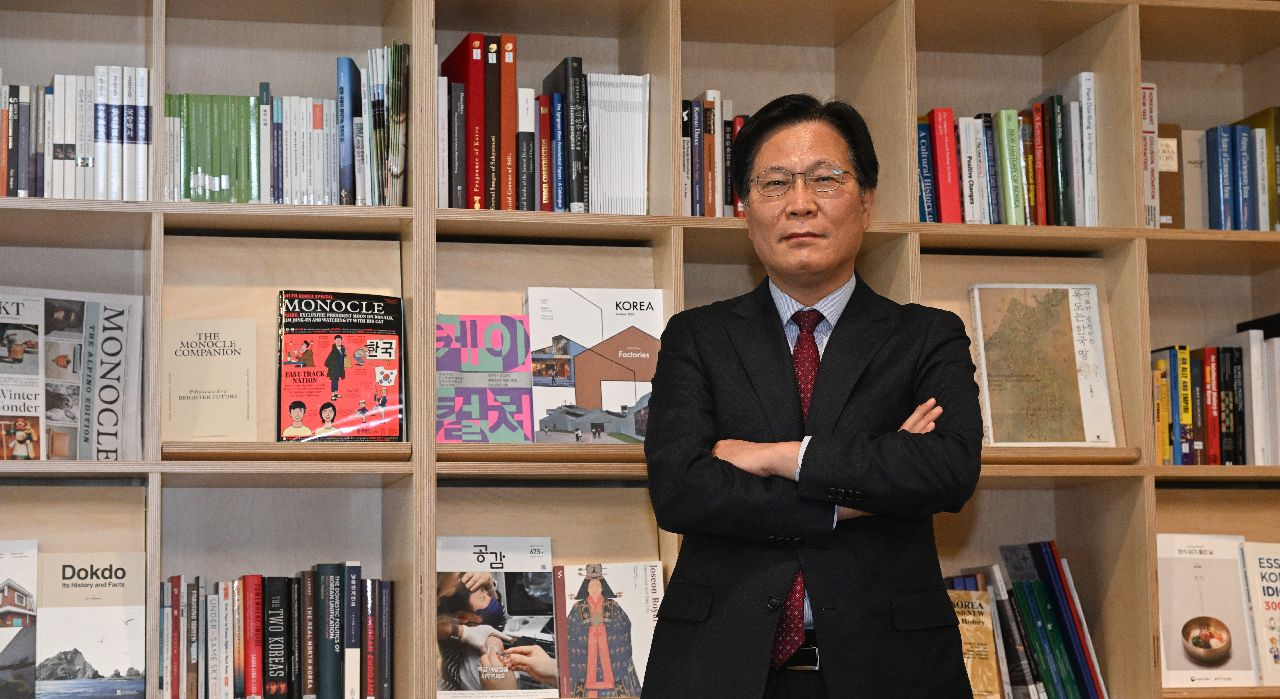[Herald Interview] Culture promotion agency to play more active, expanded role after pandemic
By Park Ga-youngPublished : Feb. 14, 2023 - 18:06

With the country moving further away from the pandemic, the Korean Culture and Information Service is going full steam ahead in its endeavor to catapult Korean culture this year further around the world.
Kim Jang-ho, the head of the agency, is a veteran government official who joined the Culture Ministry in the mid-1990s when the government body realized the importance of culture and art as an industry and created a division called the Culture Industry Department. It was when the movie "Jurassic Park" surprised the world by generating a box office revenue $850 million in just one year, which was equivalent to the profit earned by exporting 1.5 million Hyundai cars.
Almost 30 years later, the cultural sector has indeed become so important that it is on par with other important exports like semiconductors and automobiles.
“I feel a great responsibility to take this important role at a critical time,” Kim told The Korea Herald during an interview earlier in February. He took the helm of KOCIS in September last year and has been thinking about how the center can create synergy with other industries and help boost the country’s image.
“During the pandemic, many global citizens enjoyed Korean content through the internet, now as we put the pandemic behind, it would an explosive year,” Kim said.
“For those who are interested in Korean culture, Korean culture centers will be one of the closest physical places for them to have hands-on experiences about Korea.”
Kim, attributing the popularity of "K-culture" to those in the culture and art industries, said KOCIS will help Korean cultural businesses, especially smaller ones, make forays into other countries.
“There is no clear-cut answer as to why K-culture has grown this much, but the most important force behind the growth is the artists and those who are in the industry and their creativity and imaginations, while the government has faithfully tried to support them in terms of policies and finance,” Kim added.
“Interest in Korea will inevitably translate into interest in Korean products. Not to mention that content itself is the realm of a huge industry. So we will help those who have been neglected in the past like our SMEs and musicals and other performing arts by utilizing the network of Korean culture centers,” he added.
He cited the example of how "Marie Curie," an original Korean musical, was introduced to Poland through the culture center there and is set to take the stage in 2024.
This focus on helping cultural businesses does not mean its core role of introducing Korean culture would take a back seat.
KOCIS plans to offer more cohesive programs across its 33 cultural centers located in 28 nations worldwide, in addition to country-specific programs tailored to local communities.
In addition, KOCIS plans to cooperate with national organizations including the National Museum of Modern and Contemporary Art, the National Museum of Korea, the National Theater of Korea, the National Hangeul Museum and the National Gugak Center, and introduce the country's cultural resources abroad, according to Kim.
From April to December, the National Hangeul Museum and Korea Culture Centers in Poland, Germany, Austria, China and Japan will join forces for the "Transformations: Experiments in Hangeul Design" exhibition. The Korea National Contemporary Dance Company will meet audiences in the UK, Belgium and Spain with "Double Bill" while the National Gugak Center will visit the UAE, Kazakhstan and Turkey in the second of the year with its K-Maestros series.
"I hope foreigners feel close to Korea Centers located in their communities and enjoy what those centers can offer," Kim added.
The organization will open new culture centers in Sweden and Austria in the first half of this year. In addition, New York City will have Korea Center near the city’s Koreatown, with a concert hall, exhibition center and lecture room. The Korea Center in New York will become the world’s sixth full-scale Korea center, following similar hubs in Los Angeles, Beijing, Shanghai, Tokyo and Paris. It will also host various government agencies including the Korea Culture Center, the New York office of Korea’s Tourism Promotion Office, and the Korea Content Promotion Agency.
Founded on Dec. 31, 1971, KOCIS is a government organization established as an overseas public relations department, then under a central agency that promoted culture. It was then incorporated into the Ministry of Culture, Sports and Tourism in 2008. In 2021, it launched a center for foreign media in the center of Seoul. This was a broader initiative to help foreign press report on South Korea.
When asked about the longevity of the Korean Wave, Kim replied, "Culture is not a competition, but a matter of personal preference. Even if some people dislike Korean culture, we do not need to be defensive, and we should respect other cultures.



![[Exclusive] Korean military set to ban iPhones over 'security' concerns](http://res.heraldm.com/phpwas/restmb_idxmake.php?idx=644&simg=/content/image/2024/04/23/20240423050599_0.jpg&u=20240423183955)

![[Graphic News] 77% of young Koreans still financially dependent](http://res.heraldm.com/phpwas/restmb_idxmake.php?idx=644&simg=/content/image/2024/04/22/20240422050762_0.gif&u=)



![[Pressure points] Leggings in public: Fashion statement or social faux pas?](http://res.heraldm.com/phpwas/restmb_idxmake.php?idx=644&simg=/content/image/2024/04/23/20240423050669_0.jpg&u=)










